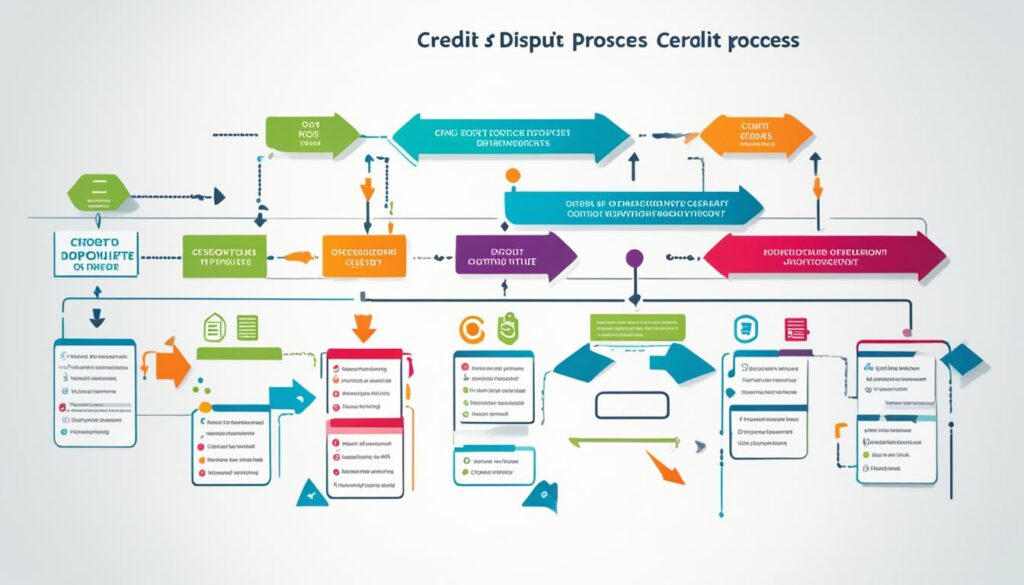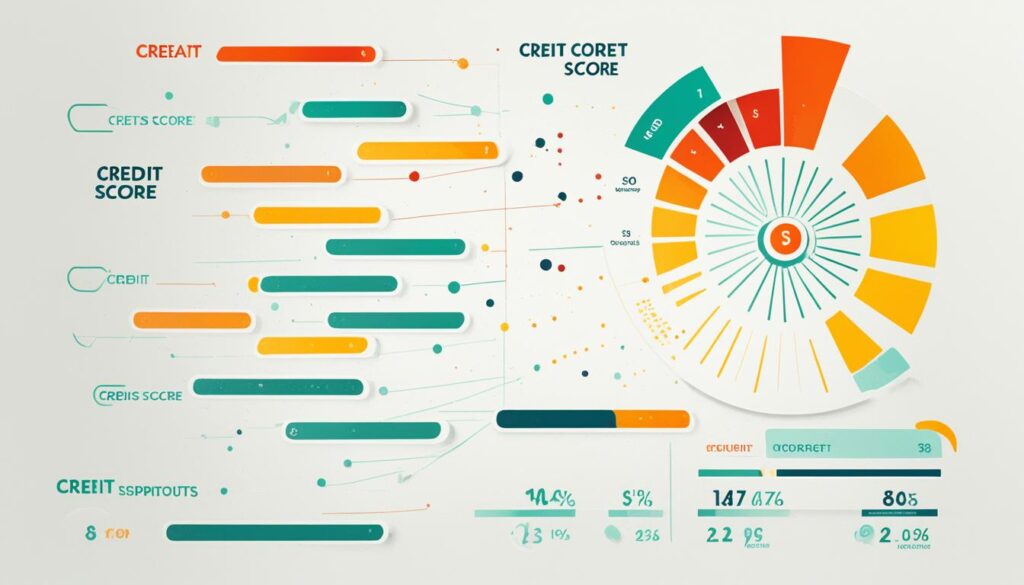Credit report errors can be stressful. Many worry that filing a dispute might hurt their credit score. However, disputes are vital for fixing mistakes and improving credit.
Credit disputes help maintain accurate reports. They let you challenge incorrect information that could lower your score. Understanding how disputes work can guide your financial decisions.
Filing a dispute doesn’t automatically harm your credit. Successfully removing errors can boost your score. Use this tool wisely and only for legitimate reasons.
Overusing disputes or filing false claims might raise red flags. Credit bureaus may view frequent disputes suspiciously. Be cautious and file only when necessary.
Key Takeaways
- Credit disputes are tools to correct report errors
- Filing a dispute doesn’t inherently harm your credit score
- Successful disputes can improve your credit standing
- Only file disputes for legitimate reasons
- Overusing disputes may have negative consequences
Understanding Credit Disputes and Their Purpose
Credit disputes help keep financial records accurate. They let people challenge wrong info on credit reports. Let’s explore why credit disputes matter.
What is a credit dispute?
A credit dispute is a formal request to fix wrong info on your credit report. It involves sending letters to credit bureaus about specific errors you’ve found.
You can ask credit bureaus to investigate and correct inaccurate. This helps ensure your credit report stays up-to-date and correct.
Why do people file credit disputes?
People file disputes for various reasons:
- Incorrect personal information
- Accounts they don’t recognize
- Negative entries that should have been removed
- Mistakes in payment history
The role of credit bureaus in disputes
Credit bureaus are key to the dispute process. They get dispute letters and look into claims. If they find errors, they update credit reports.
By law, credit bureaus must respond within 30 days. This quick response helps keep credit reports accurate.
| Credit Bureau | Dispute Method | Response Time |
|---|---|---|
| Equifax | Online, Mail, Phone | 30 days |
| Experian | Online, Mail, Phone | 30 days |
| TransUnion | Online, Mail, Phone | 30 days |
Knowing how to dispute errors helps you keep your credit report accurate. This knowledge is key to having a good credit score.
The Credit Dispute Process: A Step-by-Step Guide
Filing a credit dispute can boost your credit score. This guide helps you remove disputes from your credit report. Follow these steps for effective credit repair.

Get free credit reports from all three major bureaus. Check them for errors or issues. If you find problems, gather proof to support your claim.
Write a clear dispute letter explaining the error. Include evidence to back up your case. Send it via certified mail for proof of delivery.
Credit bureaus have 30 days to investigate your claim. They’ll contact the information provider during this time.
- Identify errors in your credit report
- Collect supporting documents
- Write a detailed dispute letter
- Submit your dispute to the credit bureaus
- Wait for the investigation results
If the provider can’t verify the information, it must be removed. You’ll get written results of the investigation.
“A successful dispute can significantly improve your credit score and financial health.”
If changes are made, you’ll get a free updated credit report. Review it carefully to ensure all corrections are there.
| Dispute Method | Pros | Cons |
|---|---|---|
| Online | Quick, convenient | Limited space for explanation |
| Detailed explanation possible | Slower process | |
| Phone | Immediate assistance | No paper trail |
Stay patient during credit repair. The dispute process takes time. Being persistent and organized will help you get an accurate credit report.
How Credit Disputes Affect Your Credit Score
Credit disputes are vital for a healthy credit history. Knowing their impact on your credit score helps manage personal finances better.
Short-term impacts on credit scores
Filing a dispute may lead to a temporary flag on the item. This flag doesn’t directly change your score. However, it might influence lenders’ decisions during the dispute period.
Long-term effects of successful disputes
Successful disputes can greatly improve your credit score. Removing negative items or fixing errors often raises your score. This can lead to better loan terms and financial opportunities.
Potential risks of multiple disputes
Too many disputes in a short time can alarm credit bureaus. They might see it as an attempt to manipulate the system. This could result in slower processing times or increased scrutiny.
| Dispute Outcome | Short-term Impact | Long-term Impact |
|---|---|---|
| Successful | Temporary flag on report | Improved credit score |
| Unsuccessful | No change in score | Potential for future disputes |
| Multiple Disputes | Possible processing delays | Risk of credibility loss |
Filing disputes responsibly is crucial for a strong credit profile. It helps ensure your personal finance goals stay on track.
Types of Disputes That May Impact Your Credit
Credit disputes can affect your credit score in various ways. Knowing these types helps you navigate credit repair more effectively. Let’s explore some common credit disputes.

Incorrect personal information is a frequent issue. This includes wrong addresses, misspelled names, or incorrect Social Security numbers. These errors can mix up your credit history with others.
Account information disputes are another major category. These involve errors like incorrect balances, payment statuses, or account ownership. Fixing these issues can greatly impact your credit score.
Negative entries are crucial for disputes. These include inaccurate late payments, collections, or charge-offs. Removing these can boost your credit score significantly.
| Dispute Type | Potential Impact | Resolution Time |
|---|---|---|
| Personal Information | Low to Medium | 1-2 weeks |
| Account Information | Medium to High | 30-45 days |
| Negative Entries | High | 30-60 days |
Identity theft-related disputes are serious issues. They involve unfamiliar accounts or inquiries on your credit report. Quick action is vital to protect your credit and finances.
Disputes about hard inquiries can also be important. A single inquiry has little impact. However, multiple unauthorized inquiries can lower your score and worry lenders.
Timeframes for Credit Dispute Resolution
Credit dispute resolution timelines are vital in credit repair. Legal requirements and average resolution times guide this process. Knowing these can help consumers navigate their credit repair journey.
Legal Requirements for Dispute Handling
Credit bureaus must investigate disputes within 30 days of receipt. This timeline is mandated by the Fair Credit Reporting Act. If more information is needed, the period may extend to 45 days.
Average Resolution Times
Credit bureaus typically complete investigations within 10 to 14 days. Simple errors may be fixed in a week. Complex issues might take the full 30 days or more.
What to Do if a Dispute Takes Too Long
If your dispute exceeds the legal timeframe, you have several options. You can follow up with the credit bureau in writing. Contacting the creditor directly might also help resolve the issue.
- Follow up with the credit bureau in writing
- Contact the creditor directly to resolve the issue
- Consider learning more about credit repair strategies
- File a complaint with the Consumer Financial Protection Bureau
Stay proactive in your credit repair journey. Persistent follow-up ensures prompt and accurate handling of your credit dispute. This approach yields the best results in credit repair.
How to Remove Dispute from Credit Report
Keeping your credit history accurate is vital. After resolving an issue, update your credit report promptly. This ensures your financial status is correctly shown.
Start by contacting the credit bureau that handled your dispute. Tell them the issue is resolved. Provide proof of the resolution.

Write a letter to the credit bureau explaining the situation. Include your details and the account in question. Clearly ask to remove the dispute notation.
Send the letter via certified mail for tracking. The credit bureau has 30 days to investigate and respond. They’ll check with the creditor and update your history.
If the dispute stays, file a complaint with the Consumer Financial Protection Bureau. They’ll help protect your rights and ensure report accuracy.
| Step | Action | Timeframe |
|---|---|---|
| 1 | Contact credit bureau | Immediately after resolution |
| 2 | Send written request | Within 1 week |
| 3 | Wait for investigation | Up to 30 days |
| 4 | File CFPB complaint (if needed) | After 30 days |
Removing disputes from your credit report is crucial. It keeps your financial picture up-to-date. Follow these steps to maintain an accurate credit history.
Legitimate Reasons to File a Credit Dispute
Credit disputes are vital for boosting your credit score and keeping your financial records accurate. Knowing when to dispute can help you manage your credit wisely.
Identifying errors on your credit report
Credit report mistakes can hurt your financial health. Common errors include wrong personal info and accounts that aren’t yours. They also include incorrect payment histories and duplicate entries.
Check your credit reports often. This helps you catch and fix errors quickly.
Fraudulent activities and identity theft
Strange accounts or inquiries on your report might mean identity theft. Act fast with credit disputes. This can limit damage and protect your finances.
Outdated information
Your credit report should show your current money situation. Old info that needs removal includes:
| Item | Time Limit |
|---|---|
| Late payments | 7 years |
| Bankruptcies | 10 years |
| Paid tax liens | 7 years |
| Collection accounts | 7 years |
Disputing old info is key for an accurate credit report. Quick action on these issues ensures your credit score reflects your true financial health.
Address problems promptly to keep your credit in good shape. This helps maintain a clear picture of your finances.
Conclusion
Credit disputes are vital for maintaining accurate credit reports. They help protect your credit score and financial health. Understanding this process empowers you to safeguard your financial well-being.
Assess each dispute situation carefully. Valid reasons include errors, fraud, or outdated information. Approach disputes wisely to maintain your credit history’s integrity.
Monitor your credit report and score regularly. This helps you spot issues early and take quick action. Making smart choices about disputes strengthens your financial future.
Credit repair is an ongoing journey. Stay informed about your rights and responsibilities. This knowledge is crucial for navigating personal finance successfully.

